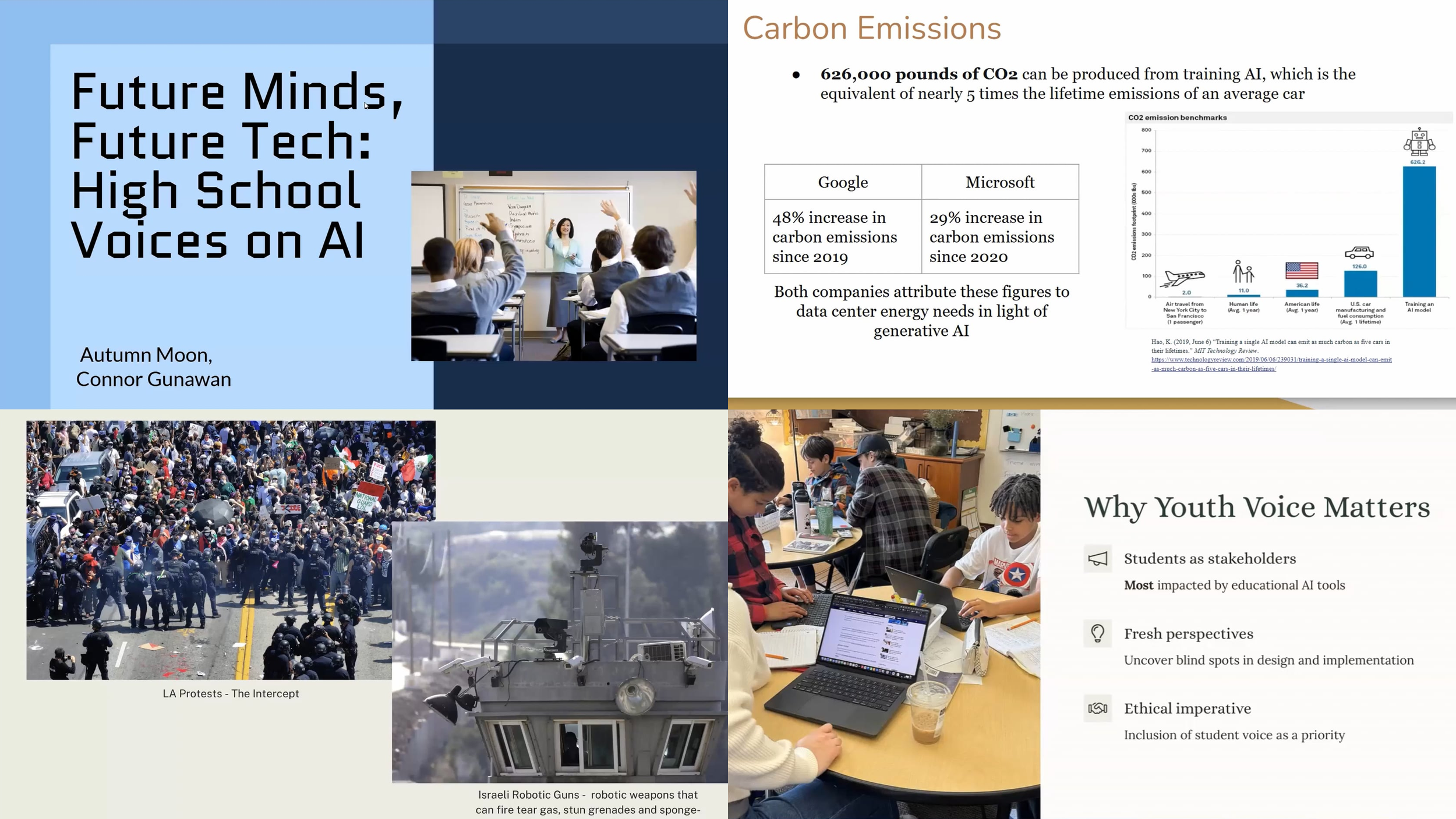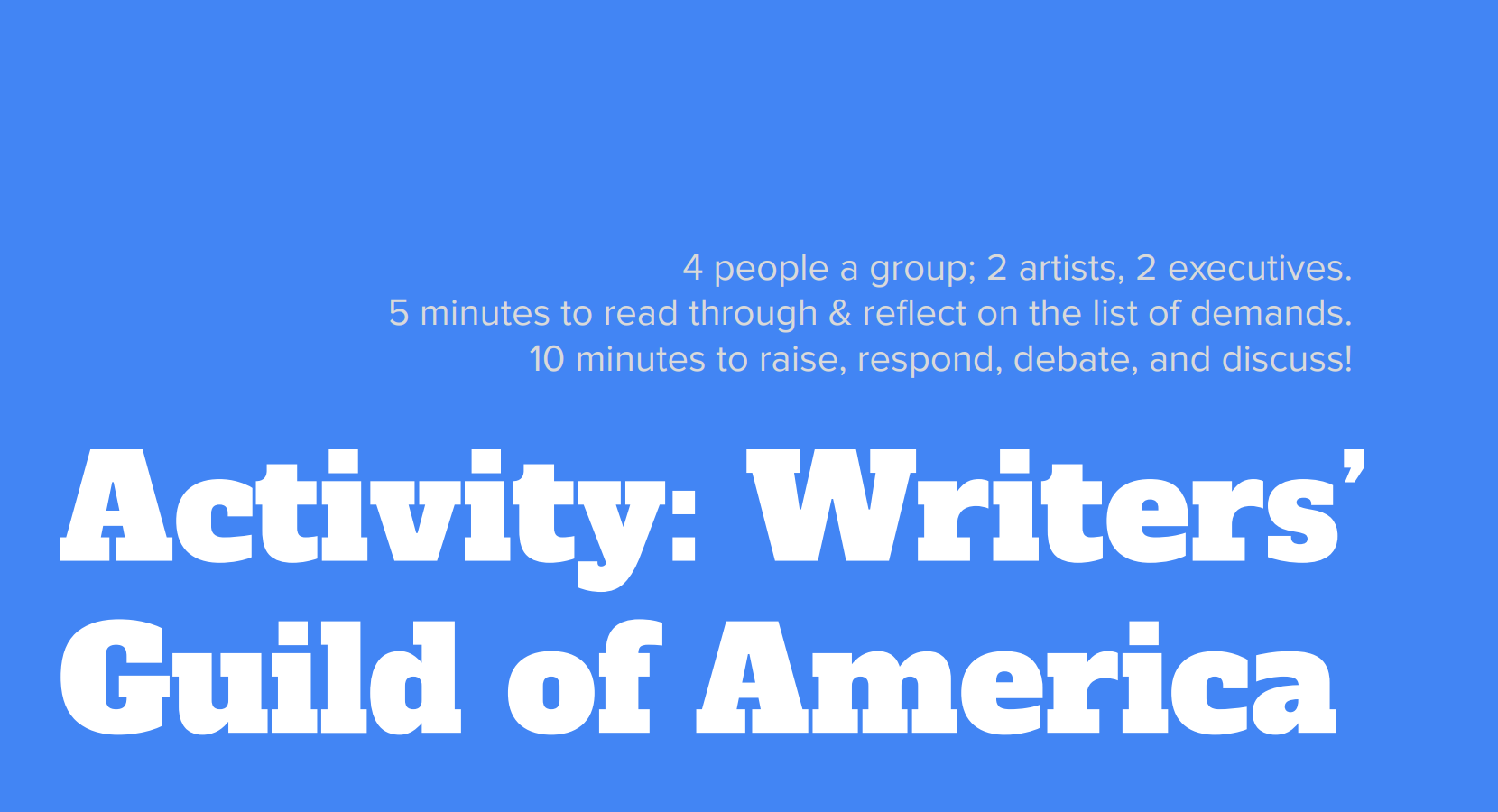Student-Led AI Ethics Research Shines on the International Stage
ACM FAccT hosts first-ever workshop featuring AI ethics research conducted by high schoolers, undergraduates, and K-12 educators.
“What could youth-centered responsible AI look like?” This was one of many central questions that AI ethics researchers and educators explored at the inaugural Data is Power virtual workshop hosted at this year’s ACM Conference on Fairness, Accountability, and Transparency (FAccT). Widely considered to be one of the most prestigious AI ethics conferences in the world, FAccT regularly draws thousands of attendees every year from across the globe to present and discuss cutting-edge research focused on technology ethics and justice.
While most workshops traditionally feature researchers with PhDs, Data is Power was the first of its kind to ever spotlight research led by high school students, undergraduates, and K-12 educators. Spanning nearly a dozen teams from classrooms across the US, speakers presented original research works on everything from AI’s environmental footprint in Georgia to how AI is shaping immigration, social media, healthcare, and K-12 education.
“Data is power - especially youth and data. All of us, whether qualitative or quantitative, can be great collectors of meaningful data that helps educate our own communities.”
By opening new avenues for young researchers in AI ethics, our workshop challenges the dominant perception of AI as a field that is only accessible to a select few. Our youngest scholars had recently learned AI ethics during the school year through pilot modules taught in their high school classrooms. Yet, their unique contributions highlight the importance of centering youth voices in shaping the emerging field of AI justice.
Accepted Presentations
Topic 1: Local and Global Communities
Representational Harms in LLM-Generated Narratives Against Global Majority Nationalities
Ilana Nguyen, Isabelle (Izzy) Nguyen
+ Speaker Bios
❖ Hi! I'm Ilana and I'm currently completing my undergrad at Brown. I have always been passionate about centering youth voice—especially surrounding technology given the disproportionate effect it has on our future. I am also broadly interested in situating AI in a global context, looking at how LLMs could be biased against certain cultures or parts of the world and how they are used in border immigration settings.
❖ Isabelle (Izzy) Nguyen is a rising junior at Stanford Online High School whose interests lie in exploring the intersections of narrative, language, and information. She is particularly drawn to how data shapes storytelling and the representational impacts of large language models.
Omitted Stakeholders: Unearthing How Strawberry Farm Workers Can Bolster the Agricultural Technology Revolution
Stephanie Tena-Meza
+ Speaker Bio
❖ Originally from Salinas, California, Stephanie Tena-Meza recently graduated with honors from Stanford University with a bachelor’s degree in Science, Technology, and Society. She previously interned at Salesforce Inc. as a Responsible AI and Tech intern and served as a Girls Who Code Club Instructor at a local Bay Area middle school. During her time at Stanford, she held leadership roles in both the Stanford Society of Latinx Engineers and Stanford Women in Computer Science. Stephanie is passionate about the intersection of technology, social impact, and community, and she actively seeks opportunities to work on initiatives that advance equity, innovation, and the public good.
Topic 2: Media and Data Ownership
AI and the Adolescent Mind: Analyzing Sentiment in Instagram Notes Using Multi-Class Classification
Michelle Marfo
+ Speaker Bio
❖ Michelle Marfo is a high school junior passionate about the intersection of AI, machine learning, and medicine. She leads independent research on multi-class sentiment analysis using Instagram Notes and interns at an Emotional AI startup. Marfo also founded STEM Explorers and the Helping Hands Committee to promote STEM education and community service. She aspires to become a machine learning engineer focused on AI-driven solutions in healthcare, assistive tech, and more.
Licensing Beyond Litigation
Aditya Gupta, Min Lu, Gus Richter, Lauren C., Bratee Podder
+ Speaker Bios
❖ Aditya: I am a 4th year Computer Science major at Georgia Tech with a minor in Law, Science, & Technology. My primary interest area is around AI ethics and the safe advancement of technology.
❖ Min: I am a master’s student at Georgia Tech studying computer science with a focus on computing systems and security. I would like to make an impact on AI security governance as the technology is now spread throughout the world.
❖ Gus: I am a doctoral student in electrical and computer engineering at the Georgia Institute of Technology.
❖ Lauren is a rising junior majoring in Industrial Engineering and minoring in Law, Science, and Technology. She is currently interning for DLA Piper and plans to go to law school to study IP law or corporate law.
❖ Bratee: GeorgiaTech Computer Science Student trying to make an impact in AI policy.
Topic 3: AI’s Impact on Youth
Future Minds, Future Tech: High School Voices on AI
Autumn Moon, Connor Gunawan
+ Speaker Bios
❖ Autumn: With the popularity of AI surging a substantial amount these past years, it's important to take a step back and see how it affects the future of our generation, teenagers. I wanted to serve as a window into the eyes of high school students, as I thought they might feel more comfortable sharing their opinions with another high school student as opposed to an adult or such. We wanted to look at the trends to see if there was a correlation on how different groups of people viewed the usage of AI in school work.
❖ Hi, my name is Connor Gunawan. I am currently a rising sophomore at Whitney M. Young Magnet High School in Chicago, with a strong interest in economics and diverse investment strategies.
AI & Employment Lesson Plan: Empowering Students through Socio-Technical Framework and Stakeholder Analysis
Cunyan Ma
+ Speaker Bio
❖ Cunyan Ma is an undergraduate student at Brown University studying Social Analysis and Research. With a background in Education and Sociology, she is interested in using teaching as a means to address societal problems. She has been conducting AI and Education research with the MIT Media Lab, focusing on social justice frameworks in teaching AI. Moving forward, she hopes to contribute to bridging the gap between researchers and practitioners, bringing AI research to the ground.
Our imperative as technologists against weaponized innovation
Angela Nguyen
+ Speaker Bio
❖ From St. Paul, Minnesota to Silicon Valley, Angela is a computer science undergraduate at Stanford passionate about advocating for tech ethics education and visibility of identities often siloed and most impacted by surveillance & military technologies.
Topic 4: Health and Environmental Policy
From Data to Diagnosis: Addressing Racial Bias in Healthcare AI
Mishayla Harve, Sakthi Priya R.
+ Speaker Bios
❖ Mishayla Harve is a rising third-year student at Georgia Tech, double majoring in Public Policy and Neuroscience. She is dedicating her undergraduate years to understanding healthcare policy and the role of social work in public health. As president of Georgia Tech’s Science and Technology Policy Connections, a student-led policy organization, she has led and supported over 10 teams in developing policy memos on diverse STEM-related issues—from biomass energy in Georgia to maternal mental health.
❖ Sakthi is a pre-med student at Georgia Tech, majoring in neuroscience and minoring in computation and cognition. She’s interested in the ways policy and science can work together to make healthcare more fair and accessible, particularly for underserved communities.
Green AI Recommendations for the State of Georgia
Katherine Logue, Minakshi S.
+ Speaker Bios
❖ Katherine Logue is an undergraduate student at the Georgia Institute of Technology majoring in Computer Science and minoring in Earth and Atmospheric Sciences. Her primary research interest is the intersection of computing and conservation, exploring how code can help address climate change. After graduating, Katherine plans to pursue a career in climate modeling.
❖ Minakshi Shivananda is an undergraduate student at the Georgia Institute of Technology, majoring in History, Technology, and Society (in essence, History and Sociology) and minoring in Climate Change. She aims to understand the unique role of climate change in the broader issues affecting society and how these issues can be transformed and alleviated within the policy sphere.
Topic 5: Teaching AI Ethics in K-12
Engaging Youth in Participatory Research and Design
Lyndsay Schaeffer
+ Speaker Bio
❖ Lyndsay is an educator and researcher in the Bay Area, California. She works at a laboratory school that is part of the education department of Mills College at Northeastern University in Oakland. Lyndsay’s work focuses on interdisciplinary curriculum design and intergenerational learning as well as participatory action research that centers youth voices and experiences.
Supporting Critical Thinking about AI Ethics in Social Media Systems through a Transformational Game
Emily Amspoker
+ Speaker Bio
❖ Emily Amspoker is a recent graduate of Carnegie Mellon University’s Bachelor’s of Human-Computer Interaction program and an incoming PhD student in the Human-Centered Computing program at the Georgia Institute of Technology. Her research interests centers on using game design and HCI research methods to explore how to support empowerment and accessibility in education. Her current work focuses on the iterative co-design of a board game to help youth learn about AI ethics.
Interested in bringing Data is Power to your classroom? Learn more about our 2025-26 program here. Special thanks to Vryan Feliciano, Ilana Nguyen, Faye-Marie Vassel, and Jaemarie Solyst for organizing our workshop at FAccT 2025.

